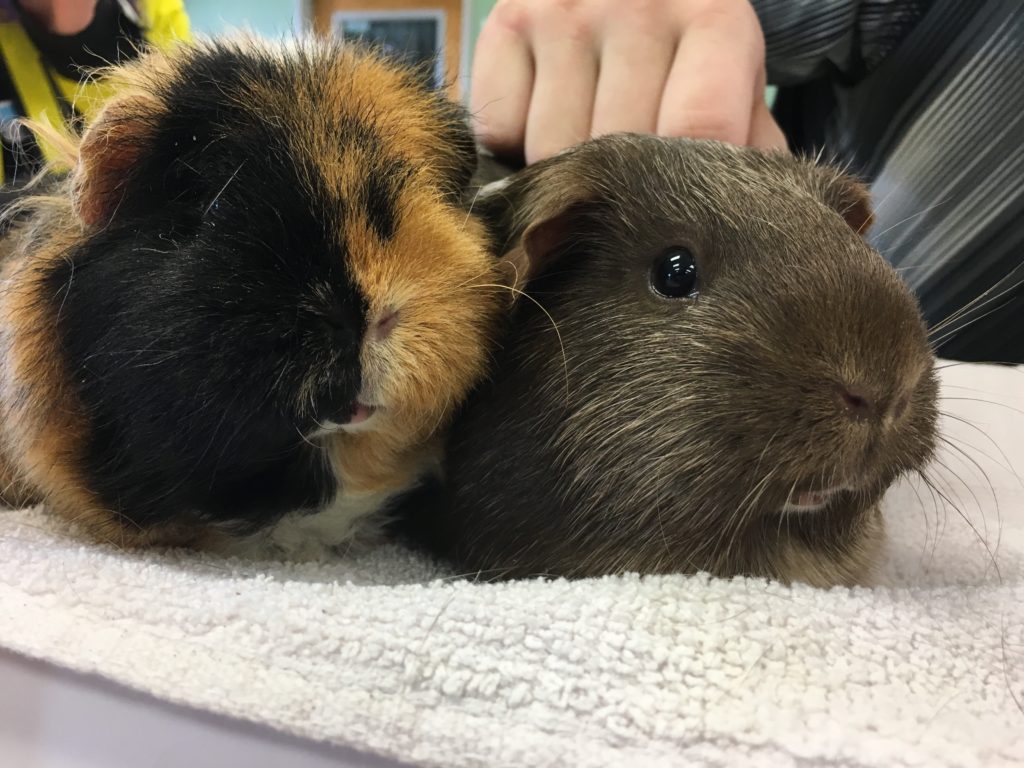Why Guinea Pigs make Amazing Pets and how to Properly Care for them
Blog post created by Sam Cryer, Greenhill Humane Society volunteer

March is Adopt a Guinea Pig month! While guinea pigs are often touted as low-maintenance starter pets, the truth is that they are a long-term commitment. They have an average lifespan of 6-8 years and require daily care and interaction. However, guinea pigs can be fun, rewarding companions for both children and adults. Read on to learn more about pet guinea pigs, and to decide whether adopting one of these cuties is right for you.
Personality
Guinea pigs are shy and can be skittish about being picked up. Don’t take it personally though—it’s just instinct. Most guinea pigs enjoy being held on a lap and petted, and have fun exploring their environment if they’re given time to warm up to it. They are most active during the day, are not prone to biting, and tend to be easy to handle.
Food
Guinea pigs should be given unlimited hay along with guinea pig pellets and fresh veggies. Guinea pigs are like humans in that they can’t synthesize their own Vitamin C, so it’s important to make sure they get a daily Vitamin C supplement.
Most guinea pigs are very food-oriented and have personal favorites among the many safe fruits and vegetables you can feed them. They quickly learn to associate the sound of the refrigerator or a rustling bag with food, and will “wheek” excitedly when they hear these noises.
Housing
Guinea pigs like their space, so the bigger their cage, the better. It’s important to use a cage with a solid floor to prevent foot injuries, and to provide fleece, or paper bedding to keep them dry and comfortable. Most guinea pigs cannot be litterbox trained, so daily spot-cleaning of the cage is a must.
Grooming
Guinea pig teeth grow throughout their life. Hay helps to keep their teeth worn down, but you should also provide wooden chew toys to help keep their teeth healthy. Long-haired guinea pigs require regular grooming, and all guinea pigs need their nails trimmed every few weeks.
Fun and Games
Regular time out of the cage, being held or enjoying supervised play time, is a great way to bond with your guinea pig and provide enrichment. Some guinea pigs are more likely to explore if you provide places to hide, so they can get to a safe place if they feel nervous. Hiding places should also be provided in the cage.
Never use exercise balls or wheels for guinea pigs, as they can cause spinal injuries. Cardboard boxes, crumpled paper, toilet paper rolls, socks and t-shirts, paper bags, and ping-pong balls are all inexpensive and safe toys that can give your guinea pig something fun to do. Happy guinea pigs will jump straight up in the air or wiggle and leap when they’re particularly excited. The official name for this happy dance? Popcorning!
How Many?
Guinea pigs are social animals that usually do best with a companion of the same gender (to avoid surprise litters). However, if they are given plenty of enrichment, love, and attention from their humans, most guinea pigs can also live happily on their own. It takes time to bond guinea pigs that have never lived together before, so if you already have a guinea pig, schedule a meet-and-greet with their potential friend before adopting to see how they respond to each other.
Is a Guinea Pig Right for You?
If you have space for a roomy cage, time to play and snuggle, and a willingness to be patient while you win your new pet’s trust, a guinea pig (or two) might just be the right pet for you! The best way to decide is to come out and meet an adoptable guinea pig in person, and to talk to our knowledgeable staff and volunteers about the realities of guinea pig ownership.
Check our “Other Pets” page to see if we have guinea pigs, and drop by to say hello. Whether you adopt or not, you’ll love making the acquaintance of our fun and furry friends!
Sources:
https://www.animalhumanesociety.org/adoption/guinea-pig-care
